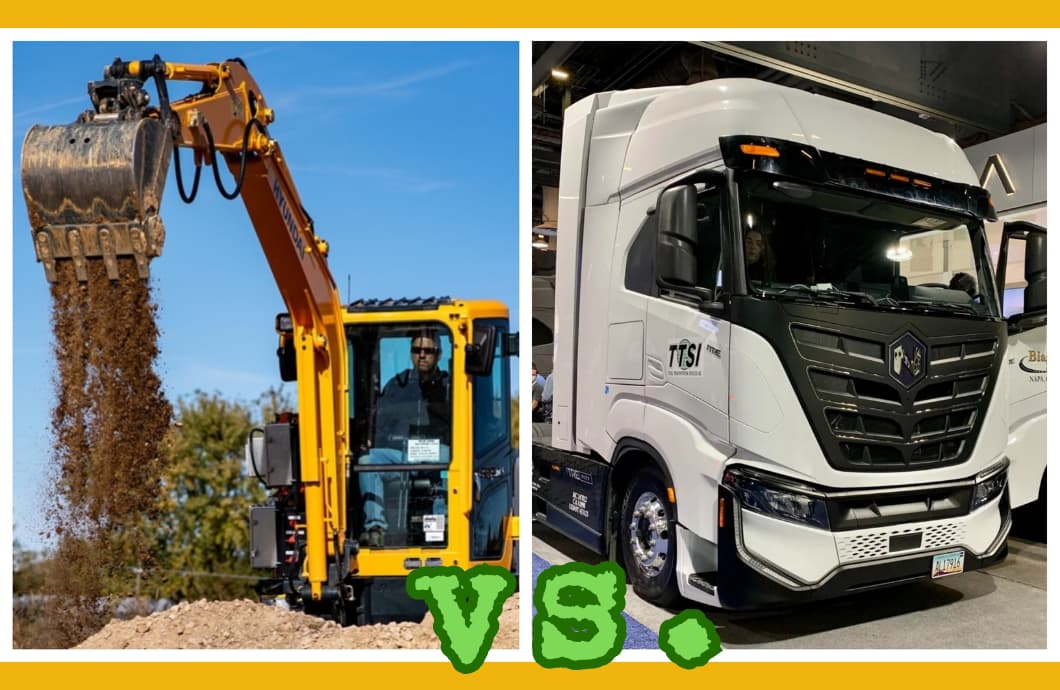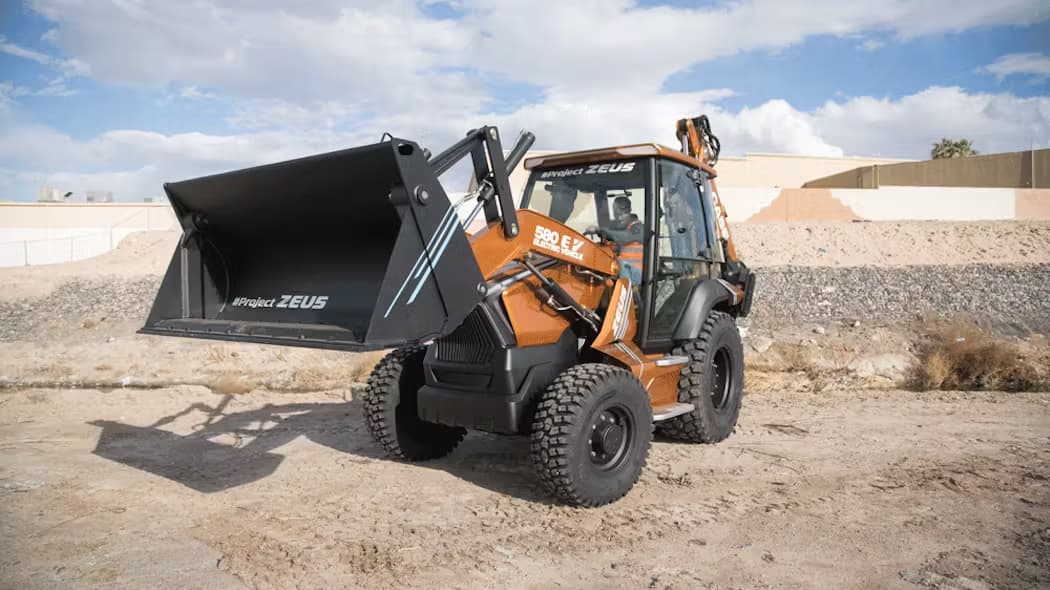
Contents:
- Operational Range & Charging Infrastructure
- Noise Pollution Requirements
- Total Cost of Ownership
- Emissions Regulations and Urban Zones
- Technological Maturity
- Public Perception and Image
Electric-powered construction equipment can be found on work sites all over the world, so why haven’t heavy electric-powered commercial trucks taken off yet? Let’s explore what’s the hold up on EV rigs vs. EV equipment.
.jpg)
Construction equipment—such as excavators, bulldozers, and cranes—typically operate within a localized area. Many of these items of equipment are only used between 4-10 hours per workday. According to EV industry insiders at Electrek.co, some models of EV construction equipment are rated to run 4-8 hours before needing recharging. Because of their centralized location and that they can be easily recharged at the end of a workday, this reduces the need for an extensive charging infrastructure.
Commercial trucks, on the other hand, often need to cover vast distances with unpredictable routes, necessitating a comprehensive charging network that is still limited or non-existent in many regions. And while Tesla is reportedly planning to build electric semi-truck charging stations between California and Texas, according to InsideEvs.com, and Volvo announced, in 2022, plans to build EV semi truck charging stations connecting many California cities, these are mere drops in the bucket when considering what would make electric semi-trucks a feasible alternative to diesel-powered trucks in the United States.
.jpg)
Construction crews often operate in close proximity to residential areas, commercial spaces, or sensitive environments where noise pollution can pose a significant concern—especially through the night. However, the use of EV vehicles provides up to a 10x reduction in operational noise according to sources at Calcalistech.com—a website covering the Israeli tech industry. This makes EV construction equipment the preferred choice for projects that prioritize minimizing disturbances to surrounding inhabitants or wildlife over traditional combustion-engine construction equipment models.
By contrast, semi-trucks predominantly operate on highways and commercial routes where such noise pollution is largely tolerated—reducing the incentive to adopt EV technology for commercial trucks.
.jpg)
While there are many hidden costs of construction equipment in general, electric construction equipment provides substantial savings in terms of fuel and maintenance costs over their lifespan. The frequent starts, stops, and idling common to construction work are better suited to electric drivetrains—which are more efficient under such conditions compared to diesel engines.
According to a write-up by Volvo, electric construction equipment has a lower operating cost than its diesel alternative, despite having nearly identical or even better machine capabilities—such as providing “instant torque.”
The piece also boasted decreased hourly wear while using electric construction equipment versus diesel construction equipment:
“With electric, as soon as the operator stops working…the motors turn off and no operating hours are accumulated. So when you think about it, jobs over time that can rack up 10,000 hours on a diesel machine might only add 6,000 or 7,000 hours to a comparable electric machine. These saved hours lower operating costs, and in turn lower total cost of ownership. They help improve resale value too.”
Commercial trucks, although benefiting from reduced fuel costs when various components are electrified, have a longer time frame to realize total cost savings.
The Environmental and Energy Study Institute claims that EV semi-trucks with a 375-mile range “would have” a 13% lower total cost of ownership compared to diesel semi-trucks. Though seemingly compelling, these numbers reflect ideal conditions with a plentiful infrastructure of charging stations. Also, this projected $200,000 savings over the life of the truck still fails to reconcile the current double or triple upfront purchase price of the vehicle—making EV trucks still less feasible for those looking for a quicker return on their investment.
All of this means that the commercial trucking operations ROI timeline might be elongated due to the additional costs associated with setting up or accessing a working charging infrastructure. Time will tell, but so far, the rubber has failed to meet the road much beyond goals stated in press releases that many claim are more marketing speak than business initiatives.
.jpg)
Many urban areas are clamping down on emissions from construction activities due to their immediate impact on local air quality. This has made electric construction equipment a popular choice, given their zero emissions at the point of use. In fact, according to ForConstructionPros.com, many cities around the world have even begun to ban the use of diesel-powered vehicles within their city limits.
Commercial trucks, on the other hand, while also subject to emission regulations, often operate over broader regions where regulations might be less stringent. These lax emissions standards are slowing any immediate push towards electrification.
Battery technology suitable for construction equipment has reached a point where it can offer sufficient power and operational hours comparable to traditional equipment.
Semi-trucks, especially those intended for long-haul operations, would require larger and more advanced batteries that can sustain high speeds and loads for extended periods. For example, according to Engineering Explained, the Tesla EV Semi Truck’s battery weighs upwards of 10,000 pounds—which could account for half or more of the truck’s allowed weight by the Department of Transportation. In addition to construction concerns, the technology to produce these high-performance batteries at scale and cost-effectively is still in the works.

Construction companies operating in urban areas are increasingly conscious of their public image. In a study covered by Forbes in 2021, executives in engineering and the construction industries have voiced their dedication to seeking out increasingly environmentally responsible building practices. Using electric equipment not only reduces noise pollution but also portrays the company as environmentally responsible—a selling feature for most city-dwelling clientele.
Commercial trucking, while also benefiting from a green image, has other pressing concerns like delivery times and operational costs that may supersede image considerations. While some commercial truck manufacturers are pledging their dedication to environmentally sustainable futures, such as Volvo’s plans to be “fossil-free” by 2040 and Daimler Truck setting a goal of being carbon-neutral by 2050, some question how serious the truck manufacturing industry is to the environmental cause based on lobbying behavior that aims to slow environmental regulations on the industry—and thus extend projected goal dates.
EV Semi-Trucks: Not So Much On the Road, But Likely on The Horizon
While both electric construction equipment and commercial trucks promise a greener and quieter future, the immediate needs, challenges, and benefits differ considerably between the two industries. As technology continues to evolve and infrastructure improves, it's likely that commercial trucking will catch up in the race toward electrification. But for now, electric construction equipment seems to have found its sweet spot in the market while the electric semi-truck industry and infrastructure still have quite a bit of work to do to catch up.
In the Market for Construction Equipment or Commercial Trucks?
If you’re looking to buy construction equipment or commercial trucks, your friends from My Little Salesman have you covered. View equipment listings from thousands of sellers of equipment located all over North America and beyond. Dial in the user-friendly search filters to show only precisely what you’re looking for. Enjoy a streamlined experience to get you the tools you need to get the job done.